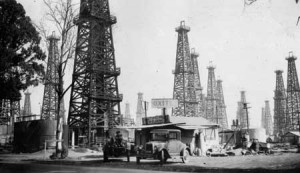Energy Transitions in History: a short bibliography
Energy availability and related environmental change and the success or failure of past societies have always been closely linked. During the early modern period the Low Countries experienced a serve wood shortage and turned to peat for fuel. By the 17th century peat extraction had become a major industry in the western and especially Northern parts of the Netherlands (see also Essay on Groningen). Entire landscapes were stripped of their peat blankets and the landscape was transformed from being a swamp into fertile agricultural land, an early example of the transformative power of fuel extraction operations.

Californian oil field, ca. 1926.
Source: Wikimedia Commons
Luckily for the Dutch, peat supplies ran low when a new fuel took over: coal. The impact of coal extraction on the environment was more extreme than peat production and transformed entire landscapes. Slagheaps and smoke stacks appeared in the landscape, polluting rivers, soils and the air. By the early 20th century another fuel rose to importance: oil. The environmental effects of oil production included oil spills at sea and on land, air pollution and, locally, the dangers of explosions and fires. In addition to environmental hazards the control of energy sources has been an important theme in world history. Much diplomatic effort has been devoted to it and many wars, most recently the Gulf Wars, have been fought to control these resources.
This incomplete list of energy use and extraction in world history illustrates the importance of this topic for understanding historical developments, and how it impacts the environment. The list below provides a short reading guide to the use of energy and energy transitions in world history with a particular emphasis to environmental issues.
Brannstrom, Christian, “Was Brazilian Industrialisation Fuelled by Wood? Evaluating the Wood Hypothesis, 1900-1960”, Environment and History, 11(2005): 395-430
Crosby, Alfred W., Children of the Sun: A History of Humanity’s Unappeasable Appetite for Energy (New York: W. W. Norton & Co., 2006)
Fouquet, Roger, and Peter J. G. Pearson. “A Thousand Years of Energy Use in the United Kingdom”,Energy Journal, 19 (No. 4, 1998): 1-41
Herring, Horace, From Energy Dreams to Nuclear Nightmares: Lessons for the 21st century from a previous nuclear era (Charlbury, Oxon: Jon Carpenter, 2005).
Horowitz, Daniel, Jimmy Carter and the Energy Crisis of the 1970s. The “Crisis of Confidence” Speech of July 15, 1979: A Brief History with Documents, (Boston, Mass.: Bedford/St. Martin’s, 2005)
Jensen, W. G. “The Importance of Energy in the First and Second World Wars”, Historical Journal, 11 (No. 3, 1968): 538-554
Melosi, Martin, “Energy Transitions in the Nineteenth-Century Economy”, in: George H. Daniels and Mark H. Rose (eds.), Energy and Transport: Historical Perspectives on Policy Issues (Beverly Hills, CA.: Sage Publications, 1982), pp. 55-69
Melosi, Martin, “The Third Energy Transition: Origins and Environmental Implications”, in: Robert H. Bremner, Gary W. Reichard and Richard J. Hopkins, (eds.), American Choices: Social Dilemmas and Public Policy Since 1960 (Columbus, Ohio: Ohio StateUniversity Press, 1986), pp. 187-218.
Myllyntaus, Timo. “Kilowatts at Work: Electricity and Industrial Transformation in the Nordic Countries”, In: Arne Kaijser and Marika Hedin (eds.), Nordic Energy Systems: Historical Perspectives and Current Issues, (Canton, Mass.: Science History Publications, 1995), 101-128.
Platt, Harold A., The Electric City: Energy and the Growth of the Chicago Area, 1880-1930 (Chicago: University of Chicago Press, 1991).
Podobnik, Bruce, Global Energy Shifts, Fostering Sustainability in a Turbulent Age (Philadelphia, Temple University Press, 2005).
Scamehorn, Lee, High Altitude Energy: A History of Fossil Fuels in Colorado (Boulder: University Press of Colorado, 2002).
Sieferle, R.P., “The Energy System. A Basic Concept of Environmental History”, in: Brimblecombe, P., and Pfister, C. (eds), The Silent Countdown (New York: Springer, 1990), pp. 9-20.
Sieferle, Rolf Peter, The Subterranean Forest: Energy Systems and the Industrial Revolution (Cambridge: The White Horse Press, 2001).
Smil, Vacla, Energy in World History (Boulder, Colo.: Westview Press, 1994)
Takács-Sánta, András, “The Major Transitions in the History of Human Transformation of the Biosphere”,Human Ecology Review, Vol. 11, No. 1, 2004, 51-66.
Tarr, Joel A., “Changing Fuel Use Behavior and Energy Transitions: The Pittsburgh Smoke Control Movement, 1940-1950 A Case Study in Historical Analogy”, Journal of Social History, 14: 561-88 (Summer 1981), with B. Lamperes.
Unger, Richard W. “Energy Sources for the Dutch Golden Age: Peat, Wind, and Coal”, Research in Economic History, 9 (1984): 221-253
Recent Comments